The impact of COVID-19 on self-harm and suicidal behaviour: a living systematic review
Almost half a million people worldwide have died from COVID-19 so far, and the pandemic is disrupting millions more lives and livelihoods.
Many people are concerned about how the pandemic is affecting our mental health. They are particularly worried about the measures that have been taken to reduce the virus’ spread, the economic impacts of lockdown and the disruption to services that has occurred as a result.
There are fears that rates of suicide and self-harm may rise during and after the pandemic, especially among high risk groups such as older people, people living with mental illness already, and children and young people.
Governments, public health officials and people working in healthcare all need high-quality scientific evidence about the pandemic’s impact on suicide and self-harm, and on how best to help prevent these outcomes.
Project aims
We collaborated with Swansea University, and several other universities in the UK and Ireland, to create a living systematic review. This provided the best available knowledge about preventing suicide and self-harm, in the context of COVID-19, in a way that was easily accessible to policymakers, public health specialists and clinicians.
Experts in suicide and self-harm prevention are collected and examined the latest evidence on a continuing basis to present an updated review every few months, so that it was available quickly for all who may need it.
What we did
We set up daily automated searches that fed into a web-based screening system. These searches looked for evidence in several areas of suicide and self-harm prevention, including:
- incidence and prevalence of suicidal behaviour
- effects of exposures to suicide
- modelling studies
- effects of interventions to mitigate the impact of pandemic on suicidal behaviour
Following initial screening, suicide prevention experts in our team review articles every day. Key publications and evidence summaries that we found were flagged and shared with policy makers in the UK and internationally.
Our review protocol was published on the open access platform F1000 Research in June 2020. We published our first living review in September 2020 and a final version in June 2021. We wrote four spin-off reviews based on evidence we identified, on the impact of COVID-19 on health and social care workers, suicide and self-harm in low- and middle-income countries, presentations to health services and suicidal and self-harm thoughts and behaviour.
Professor David Gunnell wrote a BMJ editorial ‘Trends in suicide during the COVID-19 pandemic‘, which was published on 12 November 2020.
In August 2023, we published an overview of how automation tools could be used by researchers to make the living review process more efficient. We used this review of the impact of COVID-19 on self-harm and suicidal behaviour as a case study to explore the practical challenges and barriers of using these tools.
What next?
The living review will be updated every three months if new evidence becomes available. We aim to publish a summary of the review’s findings soon.
Papers
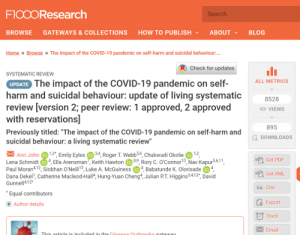
The impact of the COVID-19 pandemic on self-harm and suicidal behaviour: update of living systematic review (version 2)
Read the paper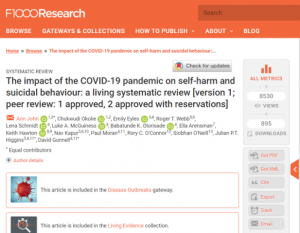
The impact of COVID-19 on self-harm and suicidal behaviour: a living systematic review (version 1)
Read the paper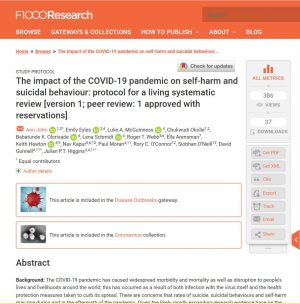
The impact of the COVID-19 pandemic on self-harm and suicidal behaviour: protocol for a living systematic review
Read the paper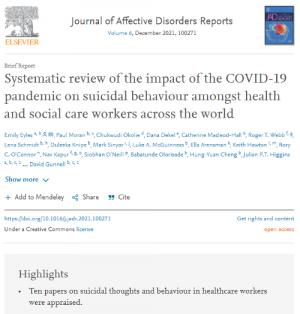
Systematic review of the impact of the COVID-19 pandemic on suicidal behaviour amongst health and social care workers across the world
Read the paper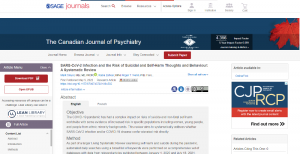
SARS-CoV-2 Infection and the Risk of Suicidal and Self-Harm Thoughts and Behaviour: A Systematic Review
Read the paper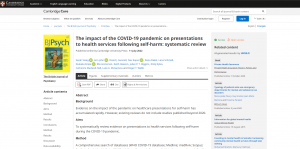
The impact of the COVID-19 pandemic on presentations to health services following self-harm: systematic review
Read the paper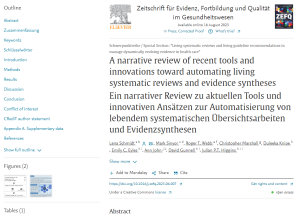
A narrative review of recent tools and innovations toward automating living systematic reviews and evidence syntheses
Read the paperLead collaborators
- Professor David Gunnell, University of Bristol
- Professor Paul Moran, University of Bristol
